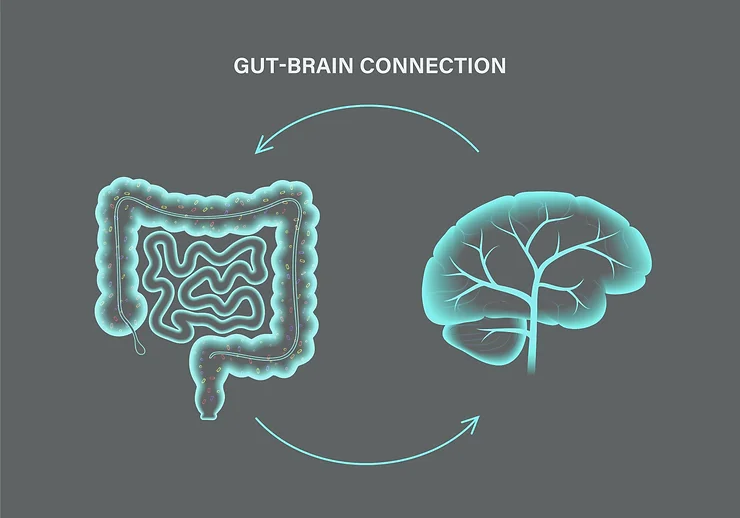What is Leaky Gut?
March 31, 2022

You may have come across the term “leaky gut” on a website or social media, but you’re not sure exactly what it is! More than 60% of Americans report having GI symptoms weekly, so I’m pretty sure most will want to read on…
Leaky gut has become a popular topic on health-focused platforms. The term “leaky gut” sounds a bit weird and therefore some in the non-scientific world are a bit skeptical as to whether it is a valid health condition. The more medically accurate term for leaky gut is “increased intestinal permeability.” It is a valid health condition and has been linked to digestive problems, autoimmune diseases, and even mental health concerns.
There is growing research to suggest leaky gut is associated with many health conditions.
A quick search of published scientific studies with the term “increased intestinal permeability” resulted in more than 10,000 published scientific articles! What exactly is “leaky gut?” Do you have it? How does it happen? What can you do about it?
What is “leaky gut?”
Your gut (gastrointestinal system) is not just a 30-foot-long muscular tube that starts at your mouth and ends with you going to the bathroom. It’s a vast and complex system with many functions. It breaks down food into smaller particles, keeps it moving through the gastrointestinal tract, and skillfully absorbs water and nutrients while keeping out harmful substances. More and more research shows that these essential gut functions affect every other system in your body—everything from your brain to your heart.
Your gastrointestinal tract is lined with millions of cells, all side-by-side in a single layer. In fact, this layer, if spread out flat, covers 400 square meters of surface area! Those intestinal cells help the body to absorb what we need from food and beverages, while keeping out what needs to stay out. It acts as a gatekeeper allowing in essential nutrients and keeping out the rest which ends up as waste. This ability to selectively allow some things in our gut to be absorbed while keeping others out is only possible if the cells of the intestinal lining are working properly and physically joined together very tightly. The bonds that keep the cells tightly together along the intestinal lining are called “tight junctions.”
Leaky gut happens when the tight junctions aren’t so tight anymore.
The cellular barrier becomes irritated and weakened, allowing tiny gaps to occur in the intestinal lining. When this begins to happen, you can’t necessarily feel it. Just like you can’t feel plaque building up in your arteries until years later it has built up so much that it could lead to a heart attack. These perforations in the intestinal lining allow things that normally would stay out of the bloodstream get into the bloodstream. Things like food particles, waste products, and bacteria.
When these undesired compounds get into the bloodstream your immune system is triggered to start fighting them. This is similar to how your immune system starts fighting the cold virus and causes inflammation. The immune reaction is normal and helps keep you healthy.
Do you have a leaky gut?
The symptoms of leaky gut are similar to those of other digestive conditions like inflammatory bowel disease, celiac disease, and Crohn’s disease. Symptoms can include diarrhea, constipation, cramps, bloating, food sensitivities, or nutrient deficiencies. At the early stages of leaky gut, you may write off some of these symptoms as “irregularity” or just related to something you ate.
Leaky gut symptoms are tricky to identify because the food particles, toxins, and bacteria have been absorbed into the bloodstream which travels throughout your body, and therefore symptoms can appear anywhere.
Studies show that leaky gut may feel like fatigue, headaches, confusion, difficulty concentrating, joint pain, or skin problems (e.g., acne, psoriasis, eczema). Leaky gut is also linked to diabetes, polycystic ovarian syndrome, liver disease, chronic fatigue syndrome, and autoimmune diseases such as lupus and multiple sclerosis. There may also be links to anxiety and depression. Many of these gut and non-gut symptoms and conditions are associated with chronic inflammation, but more research is needed to understand how they are connected.
Even if you have some of these symptoms, the fact is, it’s difficult to diagnose a leaky gut, including the severeness of the problem. This means that there are some biomarker lab tests available, but there isn’t a highly reliable diagnostic test available just yet. Current tests provide clues but are not a clear answer. If you suspect you have leaky gut, following a healthy nutrition and lifestyle program to support gut healing may provide benefit and promote general digestive wellness.
What causes leaky gut?
Research is beginning to identify what causes those bonds in the intestinal lining to loosen and result in tiny perforations in the gut barrier. Many of the contributors are related to diet and lifestyle, which are factors we can change. There is a lot of ongoing research in this area, and we will be able to build upon our current knowledge.
Part of leaky gut may be due to the genes you inherit from your parents. However, genes do not dictate our health destiny. A healthy lifestyle that includes a balanced whole foods diet, regular exercise, adequate sleep, and good stress management can override genetic tendencies towards leaky gut or other digestive health problems.
Leaky gut can result from long-term use of medications or gut infections. Leaky gut is also linked to eating a diet that is low in gut-friendly fiber (adults should aim for 25-35 g of fiber per day). Given that the average American consumes less than 10 grams of fiber daily, it is no wonder that digestive problems are prevalent in this country.
Leaky gut can also develop from consuming too much added sugar and saturated fat, both of which are too high in the average American diet. Leaky gut may result from stress, or an imbalance in the diversity and numbers of your friendly gut microbes (i.e., gut dysbiosis).
Also, as you age your cells can get damaged more easily and heal slowly, including the cells that line your gut. This can leave you more susceptible to loosening of the gut barrier.
What can you do about leaky gut?
One way to approach a suspected leaky gut is to address inflammation and follow a more gut-friendly diet. This means reducing excessive alcohol and processed foods that tend to be high in saturated fat, sugar, or artificial sweeteners. Transition to a clean, whole foods diet that is nutritionally balanced.
It’s also a good idea to avoid foods that you’re allergic or sensitive to. For example, if you have diagnosed celiac disease, you want to be sure to stay away from gluten, as exposing your gut to it can cause a large inflammatory response.
Enjoy more foods rich in gut-friendly probiotics and fiber which is a prebiotic (food for your friendly gut microbes). These include:
- yogurt or kefir
- fermented foods (e.g., kimchi, sauerkraut, and miso)
- fruits and vegetables (e.g., berries, oranges, broccoli, carrots, and zucchini)
- nuts and seeds (e.g., walnuts, cashews, and chia seeds)
- whole grains (e.g., oats, quinoa, etc.)
If you’re going to proactively increase your fiber intake, do it over several days or weeks because sudden increases in fiber can cause gas, bloating, and other gut discomfort. If you have IBS, talk to your doctor, or a Registered Dietitian Nutritionist to see if certain fibers may worsen your condition and which ones are recommended.
Also, regular exercise can help your digestive system. Even a daily 20-minute walk can benefit your digestive health. And don’t forget the importance of stress management, quality sleep, and refraining from smoking.
The Bottom Line
When it comes to leaky gut, a few simple shifts toward a gut-friendly diet can help you address leaky gut symptoms and begin the gut healing process. Adding in the lifestyle changes discussed above may help the gut heal more quickly.
A leaky gut is associated with gut and non-gut symptoms. It’s an inflammatory condition that has been linked to metabolic disorders, autoimmune conditions, and even mental health problems. There is no perfect diagnostic test at this time for leaky gut. And remember, this is still a rather new area of research, so more information emerges all the time.
In the meantime, if you have symptoms that suggest a leaky gut, you can move toward a more gut-friendly diet.
Try cutting down on alcohol, processed foods, and any food or beverage that you may be allergic or sensitive to. Replace these foods and beverages with ones higher in gut-friendly probiotics and fiber. And remember that regular exercise, stress management, and quality sleep are great lifestyle strategies for your gut and the rest of your body.
If leaky gut or other inflammatory symptoms are bothering you, book an Introductory Call with Kirkman Nutrition to see if my program/services can help you.
References
Almario, Christopher V. MD, MSHPM1,2,3,4,5; Ballal, Megana L. MD1; Chey, William D. MD6; Nordstrom, Carl MD7; Khanna, Dinesh MD, MSc8; Spiegel, Brennan M. R. MD, MSHS1,2,3,4,9 Burden of Gastrointestinal Symptoms in the United States: Results of a Nationally Representative Survey of Over 71,000 Americans, American Journal of Gastroenterology: November 2018 – Volume 113 – Issue 11 – p 1701-1710
doi: 10.1038/s41395-018-0256-8
Leech, B., Schloss, J. & Steel, J. (2019). Association between increased intestinal permeability and disease: A systematic review. Advances in Integrative Medicine. 6(1), 23-34. doi: 10.1016/j.aimed.2018.08.003
Fritscher-Ravens A, Schuppan D, Ellrichmann M, Schoch S, Röcken C, Brasch J, Bethge J, Böttner M, Klose J, Milla PJ. Confocal endomicroscopy shows food-associated changes in the intestinal mucosa of patients with irritable bowel syndrome. Gastroenterology. 2014 Nov;147(5):1012-20.e4. doi: 10.1053/j.gastro.2014.07.046. Epub 2014 Jul 30. PMID: 25083606.
US Department of Agriculture, Agricultural Research Service. 2020. Food Patterns Equivalents Intakes from Food: Mean Amounts Consumed per Individual, What We Eat in America, NHANES 2017-2018
Trends in Dietary Carbohydrate, Protein, and Fat Intake and Diet Quality Among US Adults, 1999-2016. Shan Z, Rehm CD, Rogers G, Ruan M, Wang DD, Hu FB, Mozaffarian D, Zhang FF, Bhupathiraju SN. JAMA. 2019 Sep 24;322(12):1178-1187.
Mu, Q., Kirby, J., Reilly, C. M., & Luo, X. M. (2017). Leaky Gut As a Danger Signal for Autoimmune Diseases. Frontiers in immunology, 8, 598. doi:10.3389/fimmu.2017.00598
Obrenovich M. (2018). Leaky Gut, Leaky Brain? Microorganisms, 6(4), 107. doi:10.3390/microorganisms6040107
US Department of Health and Human Services and US Department of Agriculture. (2015). Dietary Guidelines for Americans 2015-2020, eighth edition. Appendix 7. Nutritional Goals for Age-Sex Groups Based on Dietary Reference Intakes and Dietary Guidelines Recommendations.

Lisa Kirkman is a Registered Dietitian and Functional Nutritionist who helps people move beyond treating symptoms and resolve their health challenges. Using advanced functional lab testing and evidence-based practices, Lisa and her clients team up to resolve underlying imbalances, heal the gut, and restore vibrant whole-body health.
Can’t Eat Without Bloating?




